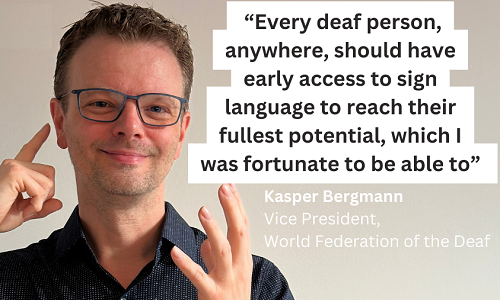“Only two months after I was born, my parents could tell that I was deaf. When it was confirmed at the hospital, the doctor shared, “I regret to tell you that your son is deaf”, to which my parents nonchalantly replied, “There is nothing to be sorry about, he will be fine”.
Kasper Bergmann, Vice President World Federation of the Deaf Denmark.
Hence from very early childhood, I was exposed to Danish Sign Language and deaf adults, who served as role models. I also received my first hearing aids, when I was six months old, even though I was diagnosed as profoundly deaf.
When I reached school age, I was enrolled at a school for the deaf in Denmark. All the kids had hearing aids as it was very important for the school that we could hear something. But it was painful for me to have the loud sounds blasting into my ears all day; at times feeling dizzy when I took the hearing aids off at home after a long day. The audiologists and teachers dismissed my complaints; my hearing aids were properly configured according to my hearing curve and I should cooperate and get used to them. I did not want to use them as I did not benefit like my classmates did, but I was forced to.
During my adolescent years, the dizziness turned into tinnitus which I continued to suffer with for 20 years after using hearing aids. As a young adult I decided to refuse to put my hearing aids on. I realised that I was comfortable with the silence – hearing sounds did not give me any benefit. I wished the people around me would have listened when I told them that my hearing aids were too loud.
After completing my primary education at the deaf school, I went to high school and university with sign language interpreters. It was quite a change of environment – from a full sign language environment to the mainstream higher education system as the only deaf person present. I coped well with the new situation since I had my family and friends, with whom I could communicate effortlessly in sign language. My energy was focused on pursuing my academic education, culminating in a degree in economics from University of Copenhagen.
I landed a job at the National Health Authority, working with health economics. I had access to a sign language interpreter and worked on equal terms as my hearing colleagues. I thought I would pursue a glorious career as a civil servant within the Danish government, but the universe had different plans. Some years later, I received an exciting offer, which I could not refuse, a development worker at Ghana National Association of the Deaf. In Ghana I met many parents in villages, whose deaf children did not get diagnosed until several years later, did not know where to get help, where the deaf schools were, or know about sign language. I met some deaf children around the age of 5-7 years without any language at all, who could not even communicate with their parents. I was heartbroken, as I knew it was too late for the children to fully acquire a language. After 18 wonderful months in Ghana, I knew my passion was in international cooperation and development work.
Fast forward, today I am Head of International Cooperation at the Danish Deaf Association, overseeing projects in nine countries in the Global South, promoting the right to sign language. I am also Vice President of the World Federation of the Deaf, championing the human rights of deaf people. The World Report on Hearing is an important tool to raise awareness about ear and hearing care; I am proud to have been a part of the work in developing this report. Furthermore, I get the opportunity to travel a lot around the world meeting awesome people. The gist of my work life is to ensure that every deaf person, anywhere, should have early access to sign language to reach their fullest potential, which I was fortunate to be able to.
Because of my solid language foundation, which was established as an infant, I could easily acquire other languages, both signed languages and written languages. I passed exams in Danish, English, and German with top grades. I can read Swedish, Norwegian, and a bit of French. I speak American Sign Language, Ghanaian Sign Language, and a few other signed languages too. Now I am enjoying learning Spanish.
When looking back, I am very grateful for my life and the unexpected turns it took – even if a big part of it was audiological silence. But my life has not been silent in any other way! I am fine, exactly as my parents predicted at my very first postnatal appointment. You will be fine too, when you have found your own path in life, which you are comfortable with”.

